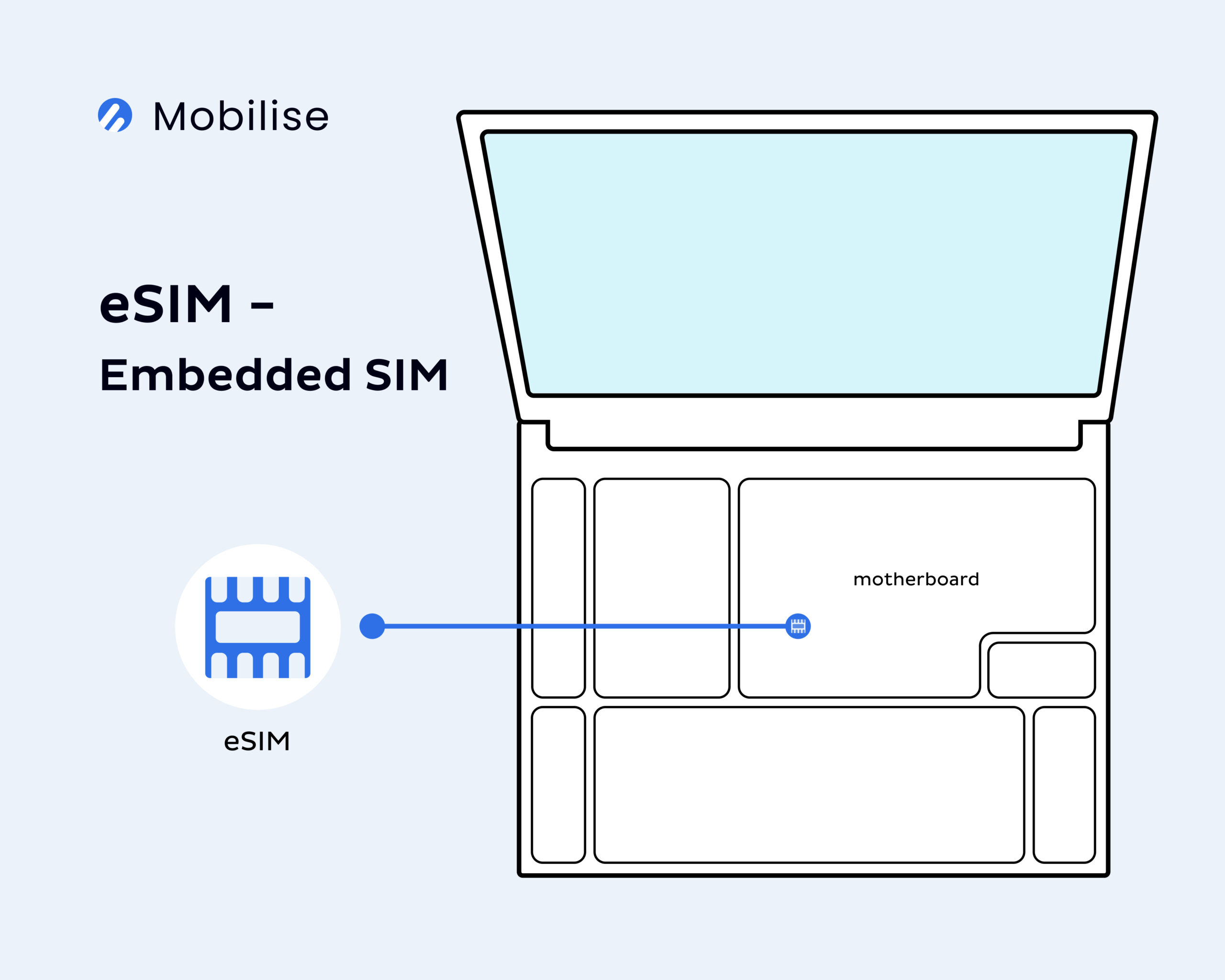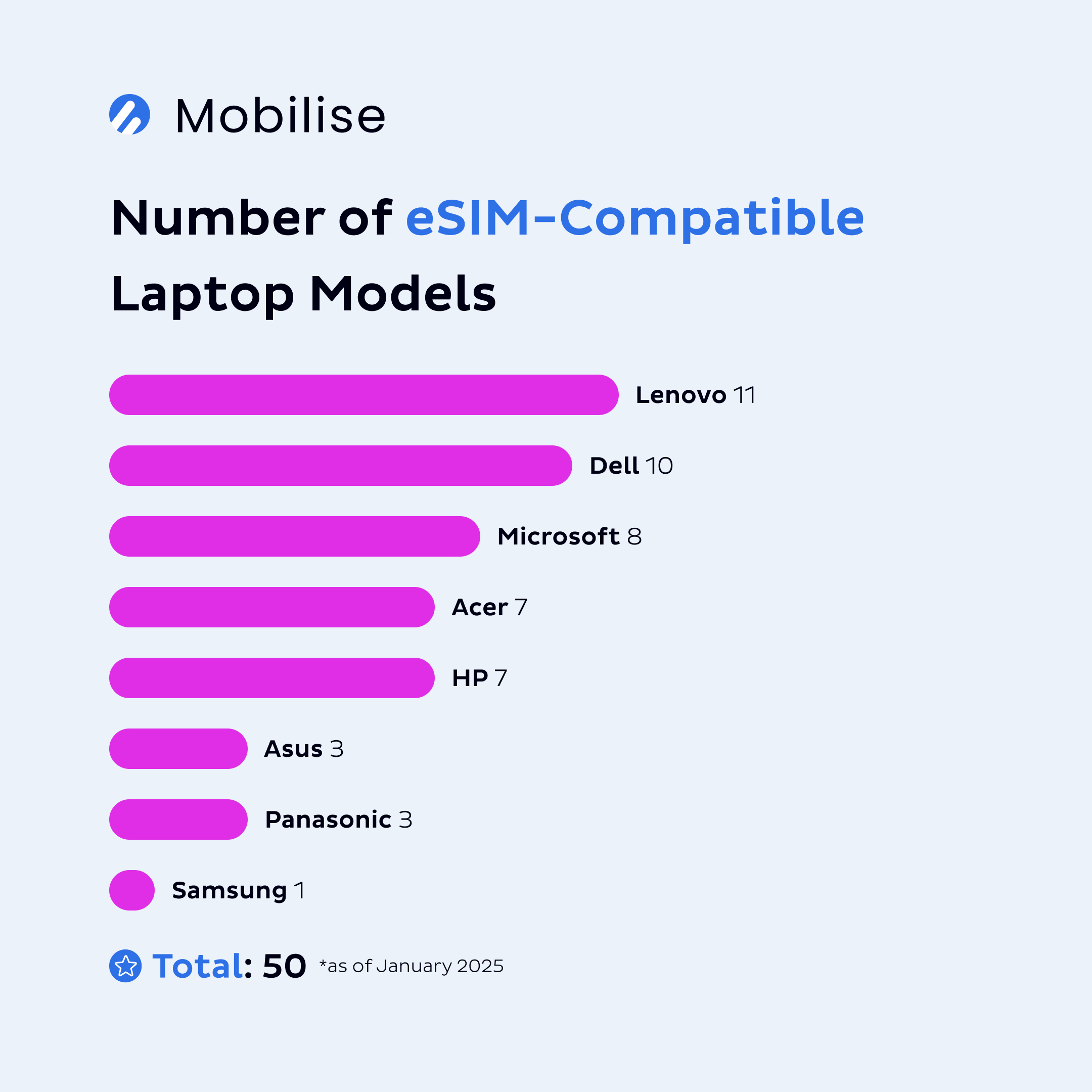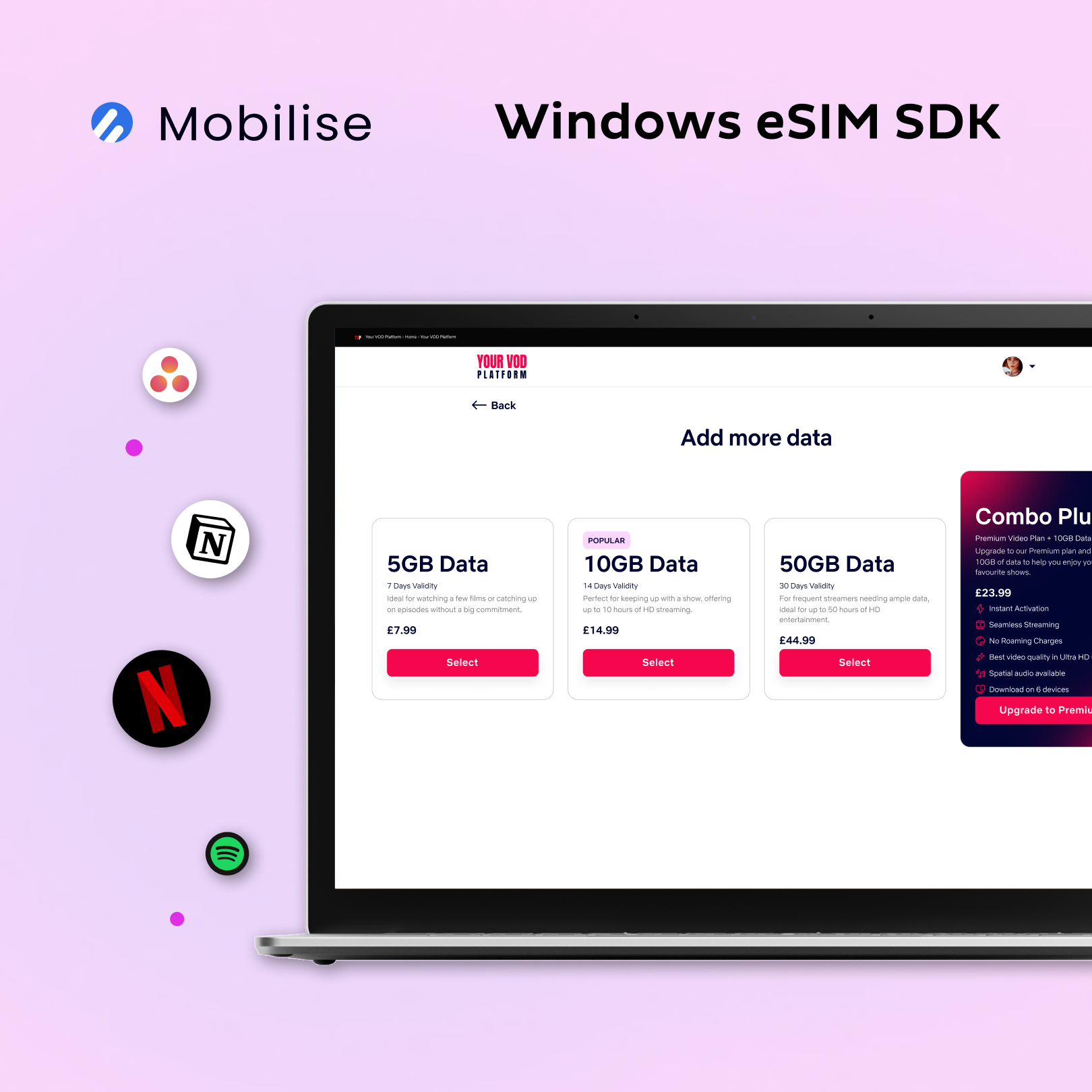eSIM is quickly becoming the go-to option for keeping people connected on the move. According to our research, 9 in 10 travellers favour purchasing travel eSIMs if given the option. By replacing traditional SIM cards with a built-in chip, eSIM eliminates the hassle of juggling physical cards, enabling instant activation and seamless switching between mobile networks. And that trend is progressively extending to other devices. With laptops increasingly used for work, travel, and entertainment, eSIM for laptops is a game-changer. This post explores three ways an eSIM laptop enhances the customer experience. First, it’s perfect for existing applications that rely on continuous connectivity—think video calls or cloud-based collaboration tools. Second, it opens a new avenue for mobile eSIM providers, letting them offer data plans tailored to laptop users. Lastly, PC manufacturers are finding value in creating built-in eSIM apps, simplifying customer setup and usage.
For those ready to make the switch, we’ve compiled a list of eSIM-compatible laptops to help you choose the right device.
TL;DR
- eSIM for laptops is a built-in alternative to physical SIMs or relying on Wi-Fi for Internet access, offering seamless activation and reliable connectivity for professionals, travellers, and remote workers.
- Key benefits include:
- Boost in-app performance (e.g., streaming, video calls, gaming).
- Creating new revenue streams for mobile providers.
- Enhancing PC brands with native eSIM management apps.
- Compatible Devices include popular models from Acer, Dell, HP, Lenovo, Microsoft, and more.
What is an eSIM Laptop?
eSIM, or embedded SIM, is a digital alternative to the physical SIM card built directly into a laptop’s hardware. It eliminates the need to rely on a physical SIM card, often spotty or unstable Wi-Fi, or mobile phone tethering, allowing users to digitally activate and manage their mobile connectivity through remote SIM provisioning and staying connected on the go. This innovation streamlines the process of accessing the Internet on a laptop, providing unparalleled flexibility and convenience.

eSIM functionality can transform how the Internet is accessed and maintained in laptops. Professionals can maintain productivity by avoiding unreliable Wi-Fi networks and ensuring continuous access to secure, high-speed mobile data. Travellers benefit from instant local data plan activation, bypassing the need to rely on public Wi-Fi or tethering options. For remote workers, eSIM for laptops delivers consistent and reliable connectivity wherever they set up their workspace, enhancing collaboration and efficiency.
RECOMMENDED READING
Why is eSIM Laptops a Game-Changer?
The demand for always-on connectivity has never been greater. From remote work to streaming entertainment and cloud-based productivity tools, users expect their devices to stay connected wherever they are. However, relying on public Wi-Fi or external mobile hotspots often introduces security risks, inconsistent speeds, and additional costs. eSIM for laptops directly addresses these challenges by offering seamless, integrated connectivity that doesn’t depend on external devices or networks.
With eSIM, laptops become true mobile-first devices. Professionals can remain connected while travelling, accessing critical work applications and collaborating in real time. Entertainment enthusiasts can stream content effortlessly without interruptions, and students or remote workers can engage with online tools without being tethered to specific locations. This flexibility is driving a shift in how laptops are used, turning them into more versatile devices capable of handling both personal and professional tasks simultaneously.
From an industry perspective, eSIM awareness and adoption is growing rapidly. By 2030, nearly 70% of all cellular devices shipped—totalling over 9 billion—are expected to feature eSIM or iSIM capabilities, driven by widespread adoption in smartphones and cellular IoT modules. This clearly reflects a trend towards embedded connectivity. As device manufacturers and telecom providers integrate eSIM into their offerings, the technology is becoming a standard feature rather than a luxury. However, eSIM has not yet been fully taken advantage of in laptops. This trend represents a significant opportunity for service providers to innovate, differentiate, and tap into new revenue streams by offering tailored connectivity plans for laptops. With the ability to activate eSIM profiles remotely, providers can reach users across the globe without the need for physical infrastructure, further reducing operational costs.
 Source: Counterpoint Research
Source: Counterpoint Research
eSIM-enabled laptops meet the rising expectations of modern users and set the stage for new business models and customer experiences, solidifying the eSIM future of laptop connectivity.
RECOMMENDED READING
3 Use Cases for eSIM Laptops
For Existing Laptop Apps
Consumer eSIM can elevate the functionality of laptop applications that rely on internet connectivity. Apps for streaming platforms, video conferencing tools, cloud storage, or online gaming all perform best with consistent and reliable internet access. With eSIM, users no longer face disruptions caused by weak or unavailable Wi-Fi signals.
Streaming platforms benefit from uninterrupted data streams, ensuring high-quality playback even when users travel. Video conferencing tools like Zoom or Microsoft Teams operate seamlessly without the risk of losing connection during critical meetings. For gamers, eSIM delivers smoother online gameplay with reduced latency, offering a better experience. This seamless connectivity enhances user satisfaction and reduces downtime, making eSIM-enabled laptops indispensable for personal and professional use.

For Mobile eSIM Providers Expanding into Laptops
Existing mobile eSIM providers face an exciting opportunity to extend their reach beyond smartphones and tablets by offering eSIM for laptops. By creating data plans tailored for laptop users, providers can tap into a growing market of professionals, students, and travellers who require constant connectivity.
This expansion allows mobile eSIM providers to diversify their revenue streams, capturing a larger share of multi-device users who prefer a unified subscription for all their connectivity needs. Additionally, offering laptop-specific plans gives providers a competitive advantage in the rapidly growing eSIM market, helping them stand out as pioneers in a space where customer expectations are continually rising. By embracing eSIM for laptops, mobile providers can position themselves as leaders in connectivity innovation.
For PC Manufacturers Wanting a Native eSIM App
For PC manufacturers, including a native eSIM management application in their laptops, offers both functional and branding advantages. An in-built application enables users to manage their connectivity directly from their device, eliminating the need for third-party tools or complex activation processes. This seamless, out-of-the-box experience can significantly enhance brand value and customer satisfaction.
Moreover, providing an integrated eSIM solution differentiates manufacturers in a competitive market, showcasing their commitment to cutting-edge features and user convenience. As eSIM adoption continues to grow, laptops with native eSIM apps will likely become a preferred choice for consumers who prioritise functionality and ease of use, giving forward-thinking manufacturers a distinct edge.
List of eSIM Laptops
eSIM is becoming increasingly prevalent in modern laptops, offering users seamless connectivity without needing physical SIM cards. In 2023, there were only 22 Windows laptops that offered eSIM support. The number of devices has since increased by 127% to 50 laptops. Below is a comprehensive list of popular eSIM-compatible laptops compiled by Holafly, organised by manufacturer:
Acer
- Swift 3
- Swift 7
- TravelMate P2
- TravelMate Spin P4
- TravelMate P6
- Chromebook Spin 511
- Chromebook Spin 513
ASUS
- Mini Transformer T103HAF
- NovaGo TP370QL
- VivoBook Flip 14 TP401NA
Dell
- Latitude 7210 2-in-1
- Latitude 9410
- Latitude 7310
- Latitude 7410
- Latitude 7440
- Latitude 9510
- Latitude 9440 2-in-1
- Latitude 5410
- Latitude 5411
- Latitude 5511
HP
- EliteBook G5
- ProBook G5
- ZBook G5
- Spectre Folio 13
- Elite Folio 2-in-1 Notebook PC
- Elite Dragonfly 2
- EliteBook 840 Aero G8
Lenovo
- ThinkPad X1 Titanium Yoga 2-in-1
- ThinkPad X1 Carbon Gen 9
- ThinkPad X1 Carbon Gen 10
- ThinkPad X1 Fold
- ThinkPad X1 Nano
- ThinkPad X12 Detachable
- Flex 5G
- Yoga C630
- Miix 630
- Yoga 520
- Yoga 720 (2-in-1 models)
Microsoft
- Surface Pro LTE Advanced
- Surface Go 2
- Surface Go 3 with LTE
- Surface Pro X
- Surface Pro 9 with 5G
- Surface Pro 8
- Surface Pro 8 LTE
- New Surface Pro 7+
Samsung
- Galaxy Book 2
Panasonic
- Toughbook G2
- Toughbook 55
- Toughbook 40

It’s important to note that while these models come with built-in eSIM support, laptops equipped with physical SIM card slots may also offer eSIM capabilities due to advancements in the telecom industry. Solutions like eSIM on a SIM card enable traditional SIM slots to function with eSIM, broadening the range of devices that can benefit from seamless connectivity.
How Mobilise Can Help with eSIM for Laptops
Mobilise’s Windows eSIM SDK is the ideal tool for PC manufacturers, telecom providers, and developers aiming to integrate eSIM functionality into laptops running on Windows 11 and above without the complexity. The SDK simplifies the implementation process, making delivering seamless connectivity for end-users easier.

With Mobilise’s Windows eSIM SDK, businesses benefit from:
- New revenue streams: Unlock new revenue streams by offering innovative eSIM solutions that cater to the growing demand for connected laptops.
- Boost in customer loyalty and satisfaction: Provide a seamless and reliable eSIM experience that enhances user convenience and strengthens brand loyalty.
- Future-Proof Technology: Stay ahead in a rapidly changing market with a solution that adapts to evolving connectivity needs.
Empowering laptops with eSIM capabilities has never been easier. Whether you’re looking to offer better user experiences or expand your business into new segments, Mobilise’s SDK has you covered.
Learn more about Mobilise’s Windows eSIM SDK solutions or schedule a demo today to see how we can help you create the next generation of connected devices.
Conclusion
eSIM is redefining how laptops connect to the internet, offering unmatched convenience, reliability, and flexibility. For users, eSIM for laptops ensures uninterrupted connectivity for work, entertainment, and travel. Mobile providers gain opportunities to expand their offerings, attract multi-device customers, and secure a competitive edge in the fast-growing eSIM market. Meanwhile, PC manufacturers can elevate their products with native eSIM apps, enhancing user experiences and differentiating brands.
The transformative potential of eSIM for laptops is undeniable, bridging gaps in connectivity and unlocking new revenue streams across the industry.



